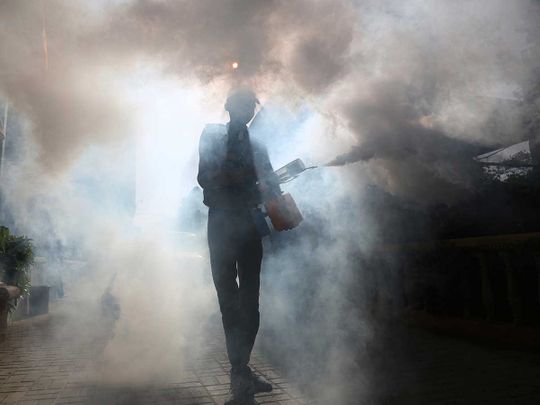Pakistan will always remain indebted to each one of the front-line

A volunteer disinfects the Karachi Press Club building in an effort to contain the outbreak of the coronavirus, in Pakistan on April 13, 2020.
Suddenly, 2020 seems to be in a hurry to wrap up its business of turning the world upside down, pondering at the possibilities of doing something other than putting up a daily global notification of the insignificance of human life. 2020 and its biggest ally, the audacious, merciless, borderless coronavirus.
I want the world to be different, safer, happier, mouths uncovered by masks when they curl up in smiles, people holding hands, hugs as free as the tinkling laughter of a six-year-old teasing my 20-year-old son. Sprinkled amidst light and love, there is pain, but there is also the assurance of that inevitability: nothing lasts forever. I sigh, silently peaceful.
Today there is something that makes me smile, albeit hesitantly.Murmuring a dua, the world of Pakistan seems a bit different, safer, happier on July 27, 2020. Pakistan’s coronavirus cases are on decline. That is so huge it almost defies any logic of the trajectory of 2020 in its unabashed indifference to known rules and regulations of human mortality.
In the words of M Bilal Lakhani, a Pakistani journalist, and someone whom I like for his constancy about showing the positive side of Pakistan while highlighting its darker aspects, the end-July scenario is “Pakistan’s stunning flattening of COVID-19 curve.” The word “stunning” sums it up in its twin simplicity: it is very surprising, and it is very impressive.
Allah shows His mercy in countless ways. Some are visible, some remain un-understood.
Worst over?
Quoting State Minister of Health Dr Zafar Mirza, from Lakhani’s Express Tribune article, “First of all, it’s a fact that Pakistan crossed its COVID-19 peak in the middle of June. Even by our own estimates, we were expecting the peak to hit us in July or mid-August and there are a number of factors that are driving this early decline.” Two of those factors are “change in human behaviour [Pakistanis understanding the risk of COVID-19 and taking precautions seriously] and early, effective interventions by the government [for example, 2,300 smart lockdowns impacting 47 million Pakistanis].”
Lakhani writes, “Dr Mirza detailed the more than fifty evidence-based policy decisions rooted in data that helped Pakistan flatten the curve ahead of expectations.” To Lakhani’s “how did you stay grounded in data when there was mass hysteria in the press and political pressure from the opposition to change course?” Dr Mirza’s response is an uncomfortable manifestation of the odds of perception and behaviour the government has had to and still continues to fight in addition to the horror of coronavirus: “We quickly identified the source of this hysteria… that came from the upper, middle class of Pakistan, which had the resources to watch Netflix and not worry about their incomes. They wanted to protect themselves by imposing mass lockdowns and ignoring what would happen to everyone else. The lower classes are voiceless and not part of the public discourse.”
Dr Mirza says, “Prime Minister Imran Khan had an unshaken resolve to look after the poor people of Pakistan in this catastrophe. No comprise on poor people, he would continue to reiterate in all our policymaking conversations.”
Without allowing any assumption about the danger of coronavirus becoming a thing of June, Dr Mirza is categorically clear about premature celebration, taking the reality into account: “With Eid and Muharram coming, this is no time for complacency.”
In Pakistan, countless doctors, nurses, para-medical personnel, and other hospital staff, from superintendents to janitorial staff, work without a pause, to ensure the availability of best possible facilities to patients of COVID-19. Some of them have succumbed to COVID-19 while taking care of patients. Some of them contracted the disease in other ways. Their service is indescribable, their selflessness is unparalleled, their sacrifices are too many to be eulogised in a caption. Pakistan was, is and will remain indebted to each one of them.
Dr Zafar Mirza is Pakistan government’s frontline person in national efforts for prevention and treatment of COVID-19. The work of Dr Mirza is indispensable in Pakistan’s continuous fight against coronavirus.
The National Command and Operations Centre (NCOC) is “nerve centre to synergise and articulate unified national effort against COVID-19, and to implement the decisions of National Coordination Committee on COVID-19.” Prime Minister Imran Khan chairs NCOC. by the prime minister to head the organisation.
In Punjab, it is Chief Minister Usman Buzdar and Punjab Minister of Health Dr Yasmin Rashid and their teams. In Sindh, it is Chief Minister Murad Ali Shah and Minister of Health Dr Azra Fazal Pechuho and their teams. In Balochistan, it is Chief Minister Jam Kamal Khan and Minister for Health Rahmat Saleh Baloch and their teams. In Khyber Pakhtunkhwa, it is Chief Minister Mahmood Khan and Minister for Finance and Health Taimur Khan Jhagra and their teams. In Azad Jammu and Kashmir, it is Minister of Health Dr Najeeb Naqi and his team. In Gilgit-Baltistan, it is former Chief Minister Hafeez-ur-Rehman, Caretaker Chief Minister Mir Afzal Khan, Commander FCNA Major General Ehsan Mehmood, Chief Secretary Khurrum Agha, Health Secretary Raja Rasheed, and Home Secretary Ali Randhawa. Their work is indispensable in Pakistan’s fight against corona virus.
Pakistan on July 27, 2020, at 12:27pm has 274,289 confirmed cases. The number of patients who have recovered from COVID-19 is 241,026. The number of critical patients is 1,229. That deeply saddens me. That is 1,229 families suffering every minute of their loved one’s hospitalization. The number of people who didn’t survive is 5,842. That to me is 5,842 families who have lost a loved one, those who cry for their irreplaceable loss every day. May the number do not increase.
May Pakistan be free of coronavirus soon.
May the entire world be free of coronavirus soon.




No comments:
Post a Comment